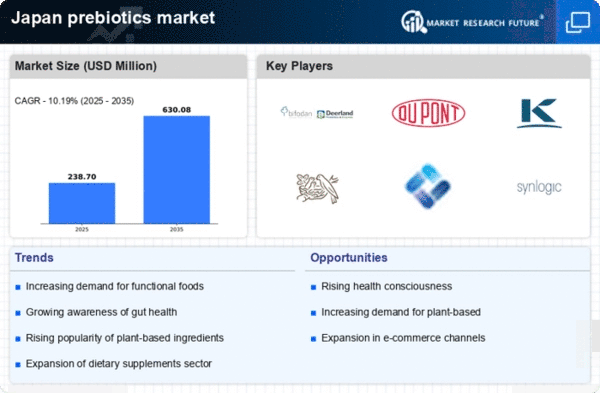Technological Advancements in Food Processing
Technological innovations in food processing are playing a crucial role in shaping the prebiotics market in Japan. Advances in extraction and formulation techniques allow for the efficient incorporation of prebiotics into various food products without compromising taste or texture. This has led to an increase in the availability of prebiotic-enriched foods, making them more appealing to consumers. Furthermore, the development of new delivery systems, such as microencapsulation, enhances the stability and bioavailability of prebiotics. As a result, the prebiotics market is likely to expand as manufacturers leverage these technologies to create innovative products that cater to evolving consumer preferences.
Increasing Demand for Digestive Health Products
The prebiotics market in Japan is experiencing a notable surge in demand for products that promote digestive health. This trend is largely driven by a growing awareness among consumers regarding the importance of gut health. As individuals become more health-conscious, they are increasingly seeking dietary supplements and functional foods that contain prebiotics. Market data indicates that the digestive health segment is projected to account for approximately 30% of the overall prebiotics market by 2026. This shift towards preventive healthcare is likely to bolster the growth of the prebiotics market, as consumers prioritize products that enhance their well-being and support digestive function.
Expansion of E-commerce and Online Retail Channels
The rise of e-commerce and online retail channels is transforming the landscape of the prebiotics market in Japan. With the increasing penetration of the internet and mobile devices, consumers are more inclined to purchase health products online. This shift is particularly beneficial for niche products, including prebiotics, which may not be readily available in traditional retail outlets. E-commerce platforms provide consumers with access to a wider variety of prebiotic products, often accompanied by detailed information and reviews. As a result, the prebiotics market is likely to experience accelerated growth, with online sales projected to account for approximately 40% of total sales by 2025.
Rising Interest in Natural and Organic Ingredients
In Japan, there is a marked shift towards natural and organic ingredients in food and dietary supplements, which significantly impacts the prebiotics market. Consumers are increasingly skeptical of synthetic additives and are opting for products that are perceived as healthier and more sustainable. This trend is reflected in the growing popularity of organic prebiotic sources such as chicory root and inulin. As a result, manufacturers are adapting their product lines to meet this demand, which is expected to drive the prebiotics market further. It is estimated that organic prebiotics could capture around 25% of the market share by 2025, indicating a substantial opportunity for growth.
Growing Awareness of the Link Between Gut Health and Immunity
There is a burgeoning recognition in Japan of the connection between gut health and overall immunity, which is significantly influencing the prebiotics market. Research suggests that a healthy gut microbiome can enhance immune function, leading consumers to seek out prebiotic products that support gut health. This awareness is driving demand for functional foods and supplements that contain prebiotics, as consumers aim to bolster their immune systems through dietary choices. Consequently, the prebiotics market is expected to witness robust growth, with projections indicating that immune health products could represent up to 20% of the market by 2026.

















